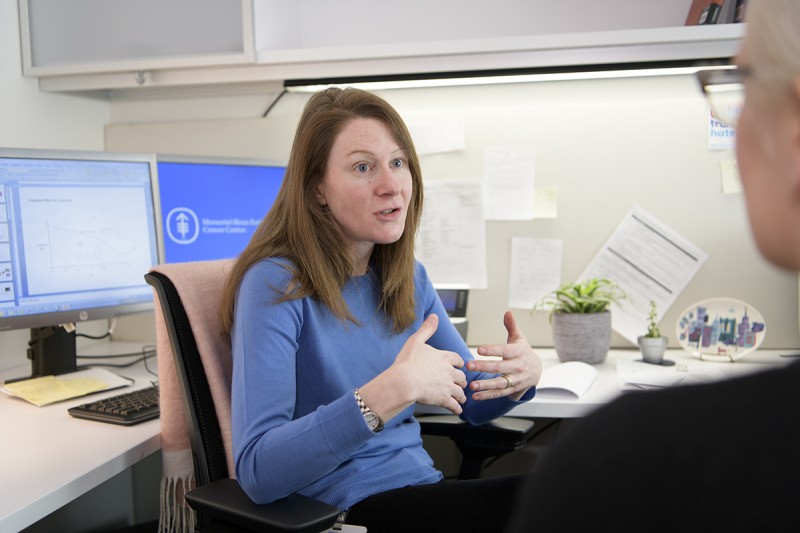
Learning that cancer treatments can affect a child’s fertility can make already difficult conversations even harder. Mindy Jaffe at MSK makes those discussions go a bit smoother.
As a nurse practitioner in MSK’s Cancer and Fertility Program, Ms. Jaffe counsels young patients and their parents on all of their family-planning options. We spoke with her about the challenges that these families face and why this work matters to her.
What impact do pediatric cancer treatments have on male and female fertility?
Girls are born with all of the eggs they’re ever going to have. They lose eggs naturally as they age. Cancer treatments, like chemotherapy and radiation to the pelvic region, destroy some of those remaining eggs. As a result, some women who were treated for cancer as children can go into early menopause in their 20s, 30s, or early 40s. This can really shorten their window of fertility. Today, we’re also learning more and more about how some immunotherapies affect fertility.
For boys, cancer treatments can affect sperm production. Depending on the dosing, this can be permanent, though many patients will recover fertility some time afterward. For some boys, it can take up to five years after treatment to recover sperm production.
What fertility preservation options are available to girls with cancer?
Fertility preservation before treatment is always optimal. For girls who have not yet reached puberty, reproductive endocrinologists can offer an experimental treatment called ovarian tissue cryopreservation (freezing). First, they remove the outer tissue of a girl’s ovary, where the immature eggs are stored. Then they freeze it and reimplant it when the girl is grown and ready to start a family.
For girls who have reached puberty, egg freezing can be done before starting treatment. Egg freezing is complicated because it can take a real emotional toll. It takes two weeks and requires monitoring by reproductive endocrinologists and daily injections. It’s an invasive process, and some teenage girls understandably don’t want to do it. But we find that girls who move forward with egg freezing handle the process extremely well and always rise to the occasion. They are closely supported throughout the entire process by a reproductive endocrinologist.
For girls who are unable to undergo fertility preservation before treatment, another option is to have a fertility evaluation once they complete treatment. We can then see how many eggs they still have. Post-treatment egg freezing may then be an option.
We don’t have reproductive endocrinologists here at MSK, but if people want to move forward, we refer them to our network of fertility specialists. The specialists we work with are so committed to our patients. They are very sensitive and make the process as easy as possible. Sometimes patients can have a consultation in the morning and then see a specialist that afternoon.
What about fertility options for boys with cancer?
For boys who have not yet reached puberty, reproductive urologists can offer an experimental treatment called testicular tissue cryopreservation (freezing). They remove pieces of tissue from the testes that hold the cells that can mature into sperm. They freeze this with the hope of being able to put these cells back into the testes when the boy is grown and ready to start a family.
For boys who have reached puberty, we recommend sperm banking before treatment, and we can do it at the patient’s bedside if needed. They can also undergo TESE, which is a surgical procedure to remove sperm, or electroejaculation, which uses a probe to stimulate the nerves used for ejaculation. In some cases, we can also shield the testes of boys undergoing radiation.
What are some barriers to fertility treatment that young patients face?
Sometimes, religious or personal beliefs about using reproductive technology present a challenge. It also can be difficult to sync up fertility treatment with the other treatments. But I think the biggest roadblock, especially with girls, is the cost. That said, there are programs that can help. Livestrong is the main organization that provides financial assistance. There is also a Walgreens program that may provide assistance for some medications. And sometimes, if the plan allows, insurance will cover the cost.
What happens during fertility counseling?
We’ll get the referral from the patient’s doctor and go meet with them and their parents. We walk them through all of the steps of each option because more education really helps with decision-making. When we go over everything in detail, we help make it less overwhelming. Many patients are still young and not even thinking about children yet. Sometimes it’s very emotional. You understand that they’re dealing with so much. Sometimes we’ll have multiple conversations.
These are sensitive issues you’re discussing. How do you make a patient feel comfortable?
Normalizing the conversation really helps. We also acknowledge that this is uncomfortable and that all of our patients are faced with this. Rose Semler, another fertility nurse, and Joanne Kelvin, the clinical nurse specialist who founded MSK’s Cancer and Fertility Program in 2009, have taught me that bringing levity to the situation sometimes helps. This can be a very emotional conversation, but I think just having the talk provides a lot of hope to these patients and their families. They know that they will be able to get through their treatment and build a family afterward if they choose to. Everyone always rises to the occasion.
What’s the most rewarding part of your job?
To get to say to a young person, “You’ll be able to have children” or “We’ll help you after treatment” is really meaningful. Some of my patients would struggle through treatment and wonder how they’d ever feel normal again. Then they’d be a year off treatment, in college, in a relationship, and a light bulb goes off for them. They’re thinking about their life again.



